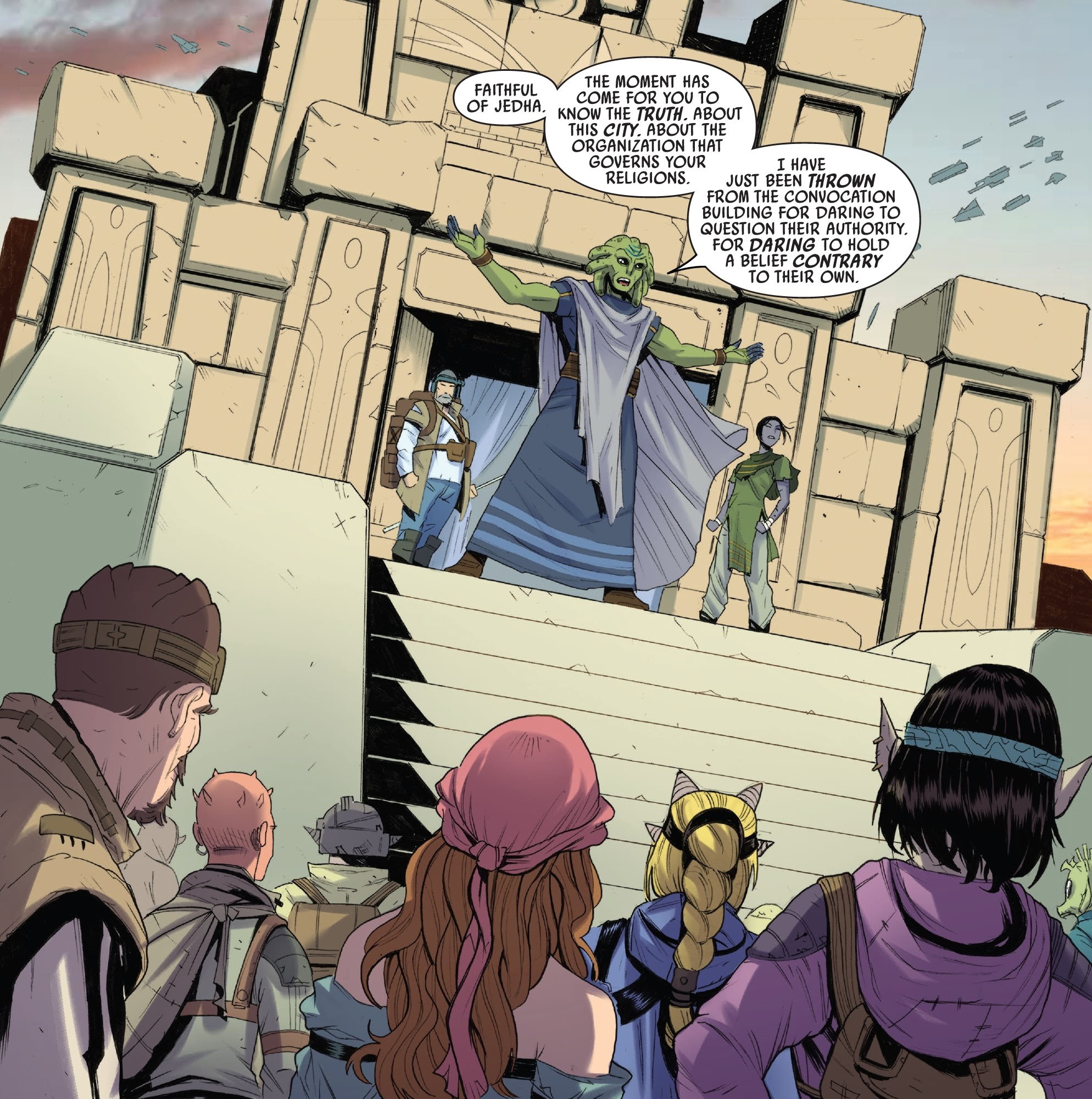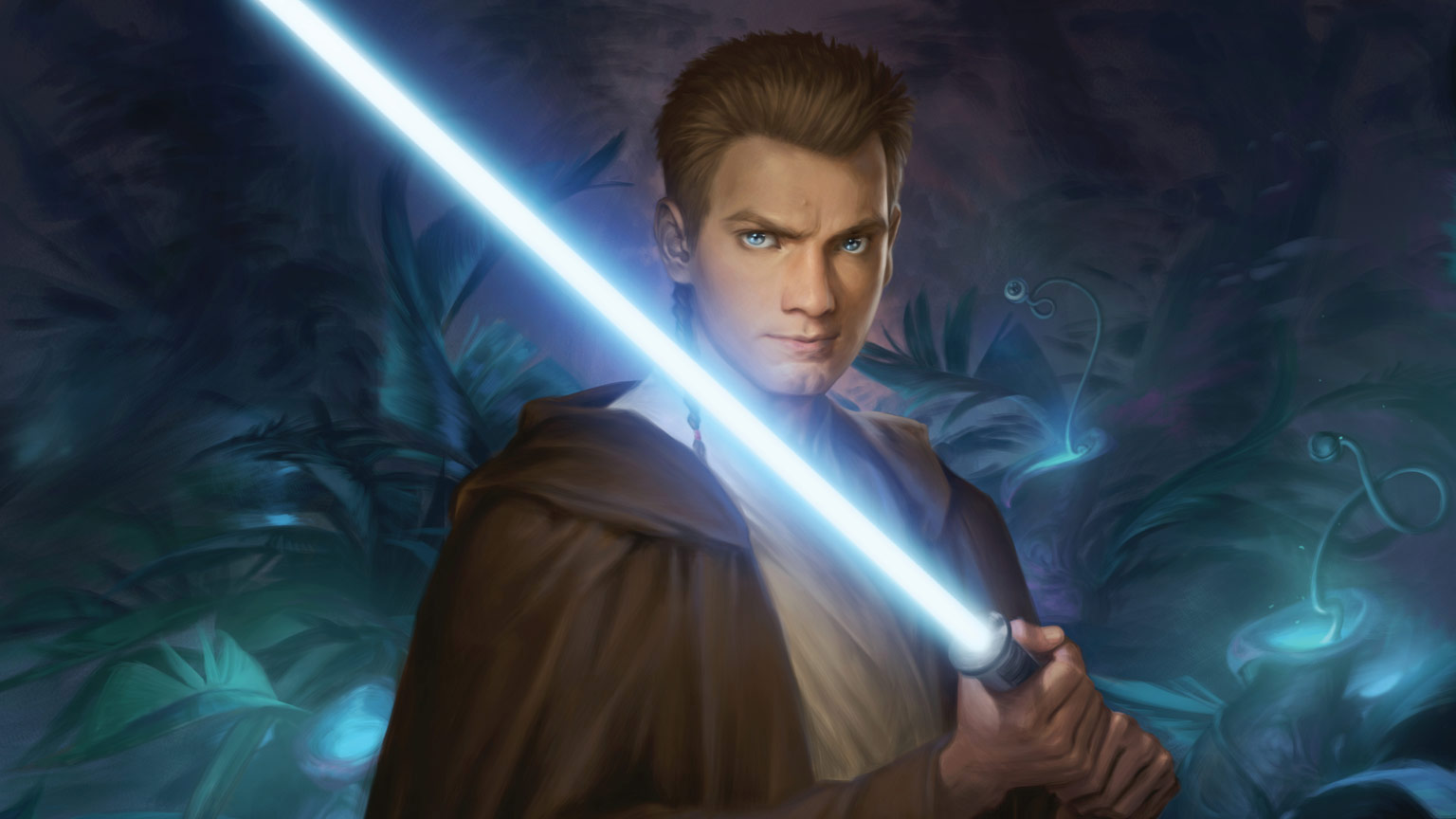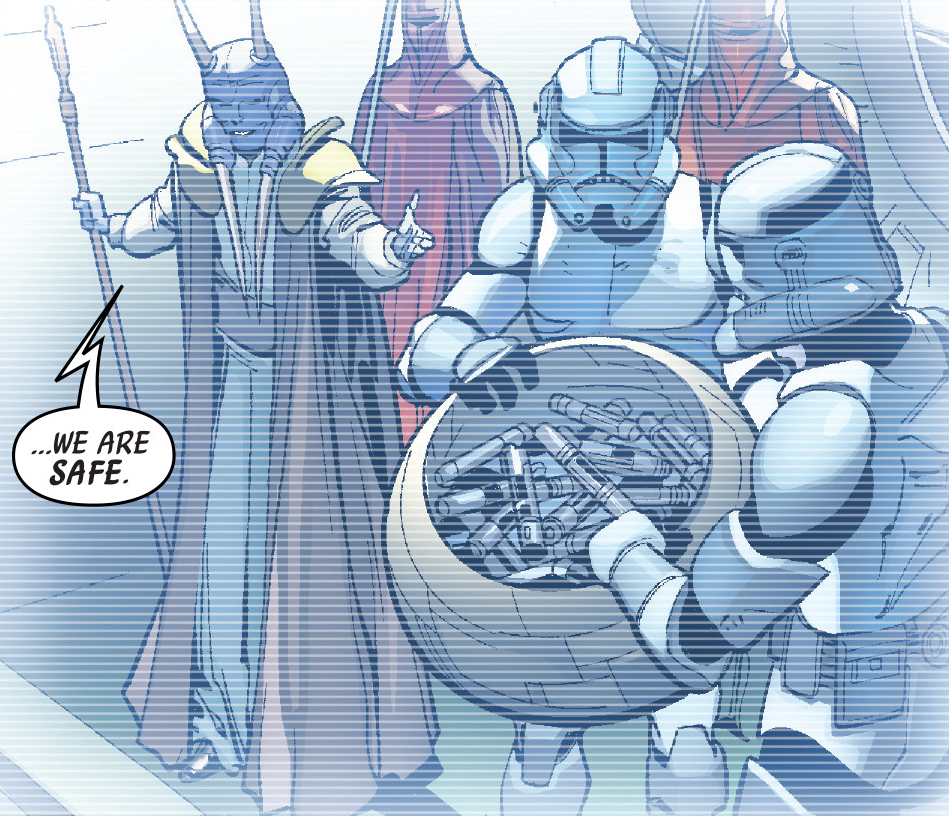Anti-Jedi sentiment referred to negative feelings, dislike, or hatred of the Jedi Order, a Force-based monastic organization whose members served the Galactic Republic as guardians of peace and justice.
Jedha City, due to its past control by the Jedi Order, was the site of some anti-Jedi sentiment during the High Republic Era. However, while there were Force groups and sensitives on Jedha who hated the Jedi, others welcomed their presence. Ultimately, most Force orders and users on Jedha were ambivalent towards Jedi. The anti-Jedi sentiment on Jedha was small enough that any Jedi on the moon could easily deal with it and carry on.

Attempting to spread its word and faith during the High Republic Era, the Path of the Open Hand espoused anti-Jedi and anti-Force user rhetoric that culminated in violent action.
The Path of the Open Hand believed the Force needed to be "free" by not being used. As such, they regarded the Jedi as an order who abused the Force and feared its use would have detrimental effects on other parts of the galaxy. One devout follower, Marda Ro, fell for a Padawan named Kevmo Zink but still disagreed with his beliefs. When Zink was killed by the Great Leveler unleashed by the Path, she was overwhelmed with grief but came to blame the Jedi Order, believing they had brainwashed the Padawan into a dangerous belief system. During the Battle of Jedha, Elder Delwin of the Path preached that the Jedi and their "abuse" of the Force was responsible for the destruction, reasoning that the Force was acting to re-balance itself through the battle. In truth, however, the Path's own leader—Elecia Zeveron, known widely as "the Mother"—was responsible for the incident and the subsequent Battle of Dalna. Path Herald Werth Plouth was also able to spur on a riot against the Jedi and overall Convocation of the Force as part of the Battle of Jedha.
The later Elders of the Path taught that the Force was something that should not be felt, let alone used, by any living being. To this end, individuals raised by them, including Zeen Mrala and Krix Kamerat, resented and feared the Jedi Order. However, Mrala's resentment was complicated by the fact that she was hiding their own Force-sensitivity, as Mrala feared her own powers due to the elders' teachings and intended never to use them. The members of the group were forced to decide whether to accept Jedi assistance after the Great Hyperspace Disaster and an attack by the Nihil. The Nihil had originally been formed by Marda, who embarked on her own crusade to destroy the Jedi Order after the Battle of Dalna and set in motion a plan to be fulfilled by later generations of her family. One such later Ro, Kufa, wrote off the Jedi as vain figures who were leading the galaxy towards destruction, just as she claimed the Path of the Open Hand had foreseen.

Obi-Wan Kenobi on the planet Lenahra, where he was faced by anti-Jedi sentiment espoused by Loegrib.
In 41 BBY, during the waning days of the Galactic Republic, the Jedi Padawan Obi-Wan Kenobi traveled planet Lenahra which he discovered possessed an unusual Power somewhat like that of the Force, but which was connected inherently to all of the planet's flora and fauna. He also discovered a group of youths that were using this power and succeeded in convincing them that doing so was damaging the planet. When Loegrib arrived on the planet with the intent of harvesting as much of the Power as possible, Kenobi tried to convince him of the wrongness of this as well. Loegrib, however, would not be persuaded and tried to use anti-Jedi sentiment to turn the others to his side as well, stating that Jedi desired to keep power for themselves and used mind tricks to bend others to their will. Kenobi found it hard to counter these arguments, as he was only a Padawan and himself had come to the planet in part because he was having doubts regarding his place within the Jedi Order. Ultimately, however, it turned out he did not need to, as the youths had already seen and accepted the truth of his words.
Some people in the galaxy found the Jedi's custom of inducting Force-sensitives into their Order at infancy controversial. Notably, the Dagoyan Masters of Bardotta regarded the Jedi as thieves and kidnappers because of that practice. Some Mandalorians, most notably members of Death Watch, held a grudge against the Jedi for their perceived crimes against Mandalore during the Mandalorian-Jedi War.

An anti-Jedi sticker
During the Clone Wars, anti-Jedi sentiment further developed in a segment of the galaxy's public opinion. Although the Jedi aroused admiration from those who witnessed them in action, they remained forever mysterious to the Republic citizenry at large. On the other side, the Confederacy of Independent Systems branded them as hypocrites, thanks to firsthand criticism by Count Dooku, leader of the Confederacy and defrocked Jedi Master. That the Jedi led an army of clone soldiers—"slaves bred for war," as Confederate propaganda proclaimed—did not speak well to their character.

Anti-Jedi signs used by protesters during the Clone Wars, which also included anti-Republic imagery. First sign reads: "Stop cloning violence" and the third sign reads: "The Jedi are corrupt."
Additionally, the Jedi's deliberate absence from the Republic's wartime propaganda adversely affected their reputation. In the absence of a proper response, disaffected Confederate worlds imagined the Jedi to be cultural elites from the Core Worlds that not only neglected them, but actually advocated war.

Mas Amedda leads the public in an anti-Jedi demonstration.
At the end of the conflict, Supreme Chancellor Sheev Palpatine of the Republic shocked the galaxy by accusing the Jedi Order of treason, claiming that four Jedi Masters had attempted to assassinate him and overthrow the Republic. Although his account of a "Jedi rebellion" was an outright lie, Palpatine easily spread that claim by reminding the galaxy that Dooku, the Republic's greatest threat in a millennium, had once been Jedi. He then reorganized the Republic as the First Galactic Empire, and started a purge to erase the Jedi from the pages of history. In the very early days of the Empire, the newly appointed Grand Vizier Mas Amedda gave a public demonstration on Coruscant—which housed the headquarters of the Jedi Order—to both take advantage and strengthen the anti-Jedi sentiment of the citizenry.
Despite the support the Naboo had shown the Jedi during the Republic Era, Reyé Hollis heard stories that the Jedi were mere glory seekers who left situations as worse outcomes. Even though the Alliance to Restore the Republic was largely supportive of the Jedi and even based its guiding principles on Jedi works, Hollis retained his anti-Jedi bias while serving in the Rebellion, but he started to change his outlook as he escaped a cave in with Commander Luke Skywalker during the construction of Echo Base.
The public's collective view on the Jedi, who were all but extinct, gradually softened following the Empire's defeat in the Galactic Civil War. Under the period of the New Republic, the Age of the Jedi was romanticized while the Jedi themselves were venerated as gods. Nevertheless, there were those who continued to harbor anti-Jedi views. One such person was Sconto, the son of a clone trooper who died in the Clone Wars. Holding the Jedi responsible for his father's death, he regarded them as power-hungry renegades and violent traitors who the clones were right to eliminate.
Even Jedi Master Luke Skywalker grew disillusioned with the Jedi over time. Having failed in his efforts to fully rebuild the Jedi Order, a consequence of his nephew Ben Solo's fall to the dark side, Skywalker grew to believe that the Order's legacy was hubris and failure, and should therefore end with his eventual death as the last Jedi. Rey, a Jakku scavenger who sought Skywalker's help against the First Order, was disturbed by the old master's jaded views and categorically rejected his arguments, reminding Skywalker of his role in the redemption of Darth Vader.
- Star Wars Propaganda: A History of Persuasive Art in the Galaxy
- Star Wars: Scum and Villainy: Case Files on the Galaxy's Most Notorious